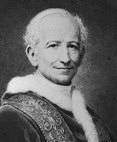 When Pope XIII published Rerum Novarum (On the Condition of Labour) in 1892, it was considered a brilliant piece of thinking on the Church walking closely with the average man and woman because it demonstrated that in reality, once again, the Church situated herself in the reality of human existence: in the social, political and economic spheres with a keen recognition of human dignity; the protection of basic economic and political rights, including the right to a just wage and to organize associations or unions to defend just claims; the right to private property; the rights of labor over capital; the just organizations of society for the common good.
When Pope XIII published Rerum Novarum (On the Condition of Labour) in 1892, it was considered a brilliant piece of thinking on the Church walking closely with the average man and woman because it demonstrated that in reality, once again, the Church situated herself in the reality of human existence: in the social, political and economic spheres with a keen recognition of human dignity; the protection of basic economic and political rights, including the right to a just wage and to organize associations or unions to defend just claims; the right to private property; the rights of labor over capital; the just organizations of society for the common good.
Pope Leo rejected not only a communistic philosophy but he did not ignore the basis of its appeal to workers and condemned the exploitative nature of the liberal-capitalist alternative. He wanted the Church on all levels to be engaged with the social order which slowly took shape in the later years of the 19th century and then in the 20th and 21st centuries.
Continue reading Labor Day: “the Church has been and is on the side of the worker”